I blow up a balloon - Study guides, Class notes & Summaries
Looking for the best study guides, study notes and summaries about I blow up a balloon? On this page you'll find 549 study documents about I blow up a balloon.
Page 3 out of 549 results
Sort by
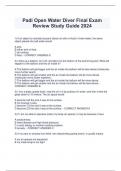
-
Padi Open Water Diver Final Exam Review Study Guide 2024
- Exam (elaborations) • 13 pages • 2024
-
Available in package deal
-
- $16.49
- + learn more
Padi Open Water Diver Final Exam Review Study Guide 2024 1) If an object is neutrally buoyant (does not sink or float) in fresh water, the same object placed into salt water would A sink. B either sink or float. C do nothing. D float. - CORRECT ANSWER-D 2) I blow up a balloon, tie it off, and take it to the bottom of the swimming pool. What will happen to the balloon and the air inside it? A The balloon will get bigger and the air inside the balloon will be less dense (molecules m...
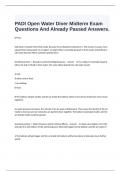
-
PADI Open Water Diver Midterm Exam Questions And Already Passed Answers.
- Exam (elaborations) • 27 pages • 2024
-
Available in package deal
-
- $10.19
- + learn more
D float. Salt water is heavier than fresh water because it has dissolved minerals in it. This means it causes more upward force (buoyancy) on an object. An object that is neutrally buoyant in fresh water would float in salt water because there is greater upward force. See Being a Diver I - Buoyancy and Controlling Buoyancy. - Answer 1) If an object is neutrally buoyant (does not sink or float) in fresh water, the same object placed into salt water would A sink. B either sink or flo...
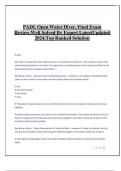
-
PADI, Open Water Diver, Final Exam Review.Well Solved By Expert LatestUpdated 2024.Top Ranked Solution
- Exam (elaborations) • 26 pages • 2024
-
- $9.49
- + learn more
D float. Salt water is heavier than fresh water because it has dissolved minerals in it. This means it causes more upward force (buoyancy) on an object. An object that is neutrally buoyant in fresh water would float in salt water because there is greater upward force. ,,, See Being a Diver I - Buoyancy and Controlling Buoyancy. - answers>1) If an object is neutrally buoyant (does not sink or float) in fresh water, the same object placed into salt water would A sink. B either sink or fl...
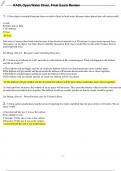
-
PADI, Open Water Diver, Final Exam Review With 100% Correct Answers 2023
- Exam (elaborations) • 28 pages • 2023
-
Available in package deal
-
- $12.00
- + learn more
PADI, Open Water Diver, Final Exam Review 1) If an object is neutrally buoyant (does not sink or float) in fresh water, the same object placed into salt water would A sink. B either sink or float. C do nothing. D float : D float. Salt water is heavier than fresh water because it has dissolved minerals in it. This means it causes more upward force (buoyancy) on an object. An object that is neutrally buoyant in fresh water would float in salt water because there is greater upward force. ...
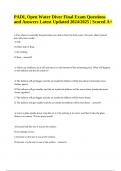
-
PADI Open Water Diver Final Exam Questions and Answers Latest Updated 2024/2025 | Rated A+.
- Exam (elaborations) • 22 pages • 2024
-
Available in package deal
-
- $13.99
- + learn more
PADI Open Water Diver Final Exam Questions and Answers Latest Updated 2024/2025 | Rated A+. I blow up a balloon, tie it off, and take it to the bottom of the swimming pool. What will happen to the balloon and the air inside it? A The balloon will get bigger and the air inside the balloon will be less dense (molecules move further apart). B The balloon will get smaller and the air inside the balloon will be more dense (molecules move closer together). C The balloon will get bigger and the a...
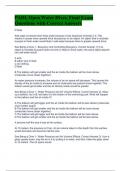
-
PADI, Open Water Diver, Final Exam Questions with Correct Answers
- Exam (elaborations) • 20 pages • 2024
- Available in package deal
-
- $13.99
- + learn more
D float. Salt water is heavier than fresh water because it has dissolved minerals in it. This means it causes more upward force (buoyancy) on an object. An object that is neutrally buoyant in fresh water would float in salt water because there is greater upward force. See Being a Diver I - Buoyancy and Controlling Buoyancy. Correct Answer 1) If an object is neutrally buoyant (does not sink or float) in fresh water, the same object placed into salt water would A sink. B either sink or ...
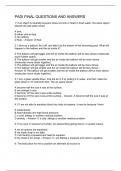
-
PADI FINAL QUESTIONS AND ANSWERS
- Exam (elaborations) • 12 pages • 2023
-
- $12.49
- + learn more
1: If an object is neutrally buoyant (does not sink or float) in fresh water, the same object placed into salt water would A sink. B either sink or float. C do nothing. D float. - Answer- D float. 2: I blow up a balloon, tie it off, and take it to the bottom of the swimming pool. What will happen to the balloon and the air inside it? A The balloon will get bigger and the air inside the balloon will be less dense (molecules move further apart). B The balloon will get smaller and the ...
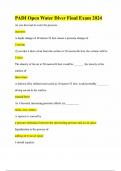
-
PADI Open Water Diver Final Exam 2024
- Exam (elaborations) • 35 pages • 2024
-
Available in package deal
-
- $17.99
- + learn more
PADI Open Water Diver Final Exam 2024 As you descend in water the pressure increases A depth change of 10 meters/33 feet causes a pressure change of 2 bar/ata A depth change of 10 meters/33 feet causes a pressure change of 2 liters The density of the air at 20 meters/66 feet would be _______ the density at the surface of three times A balloon fully inflated and sealed at 10 meters/33 feet, would probably ________ during ascent to the surface. expand/burst As I descend, increasing pres...
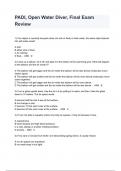
-
PADI, Open Water Diver, Final Exam Review Questions And Answers
- Exam (elaborations) • 13 pages • 2024
- Available in package deal
-
- $13.99
- + learn more
PADI, Open Water Diver, Final Exam Review Questions And Answers 1) If an object is neutrally buoyant (does not sink or float) in fresh water, the same object placed into salt water would A sink. B either sink or float. C do nothing. D float. - ANS D 2) I blow up a balloon, tie it off, and take it to the bottom of the swimming pool. What will happen to the balloon and the air inside it? A The balloon will get bigger and the air inside the balloon will be less dense (molecules mov...
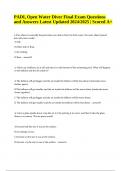
-
PADI Open Water Diver Final Exam Questions and Answers Latest Updated 2024/2025 Scored A+
- Exam (elaborations) • 22 pages • 2024
- Available in package deal
-
- $14.49
- + learn more
PADI Open Water Diver Final Exam Questions and Answers Latest Updated 2024/2025 Scored A+. If an object is neutrally buoyant (does not sink or float) in fresh water, the same object placed into salt water would A sink. B either sink or float. C do nothing. D float. - answerD 2) I blow up a balloon, tie it off, and take it to the bottom of the swimming pool. What will happen to the balloon and the air inside it? A The balloon will get bigger and the air inside the balloon will be less den...

$6.50 for your textbook summary multiplied by 100 fellow students... Do the math: that's a lot of money! Don't be a thief of your own wallet and start uploading yours now. Discover all about earning on Stuvia


